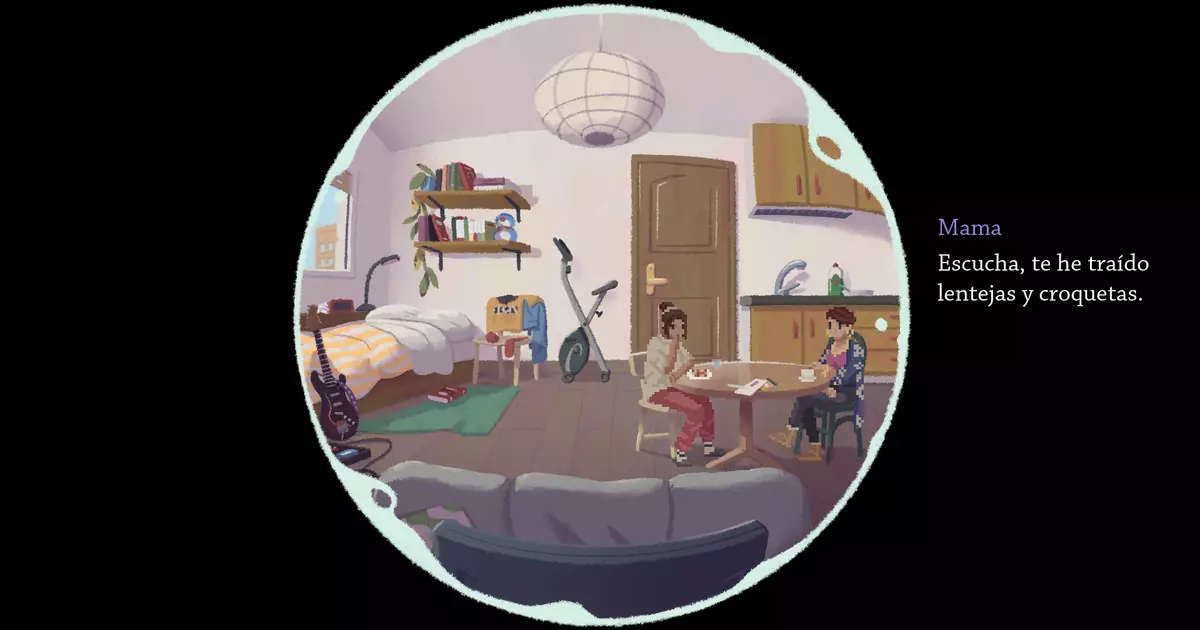Designed as an introspective experience, “Vendrán Las Aves” (translated as “The Birds Will Come”) stands out in the realm of indie games through its unique narrative approach. Conceived during a game jam by the talented trio of Francisco Riolobos, Chuso Montero, and Deconstructeam, this title offers more than mere gameplay—it evokes an emotional response centered around the universal struggle of burnout. The game’s premise begins with a character emerging from the clutches of a demanding job, only to find themselves drained and detached, illustrating a relatable journey of recovery set against the backdrop of a solitary apartment decorated like a snowglobe.
What sets this experience apart from traditional narratives is its format. Self-described as a “slice of life tamagotchi,” the game invites players to engage in resource management—a fitting metaphor for everyday life that often demands our attention and energy. Players must allocate limited energy points to various activities each day, from mundane chores to leisure pursuits, ultimately influencing the character’s well-being. By focusing on essential self-care actions and small victories, the game offers a compact yet poignant reflection on the path to rekindling joy and purpose.
The gameplay mechanics serve as a clever metaphor for the relational dynamics involved in combating burnout. The player must make careful choices on how to expend the character’s energy—whether to indulge in a television binge, order fast food, or engage in healthy self-care activities. Each decision provides insight into the character’s emotional state while highlighting the often-overwhelming nature of seemingly simple choices when faced with mental fatigue.
As a player, one witnesses firsthand the ebb and flow of motivation and energy. The character’s struggles are accentuated by their impulsive purchase of a guitar, representing both hope and an additional layer of pressure to create something meaningful while grappling with profound exhaustion—a sentiment resonant to anyone who has attempted to reignite lost passions. The mechanics highlight a critical insight: recovery is not linear. Days may slip into despondency and inactivity, yet tomorrow always brings a new opportunity for improvement.
One of the game’s subtler undertones touches on the significance of seeking help from others. By allowing the character to receive care and sustenance from family, the narrative underscores a vital principle often obscured in the dialogue about mental health: it’s okay to lean on others when the weight becomes too heavy to bear alone. This element integrates an important layer of community support, functioning not only as a gameplay mechanic but also as a pivotal reminder of the interconnectedness of emotional well-being.
The deliberate omission of a pat resolution further enriches the narrative’s authenticity. Life and its challenges are rarely resolved with a neat bow, and “Vendrán Las Aves” respects that truth. Instead of offering a prescribed path to happiness, it reflects the ongoing struggle and resilience required to reclaim joy amidst adversity. The uplifting ending, while welcoming, does not gloss over the complex reality of mental health; rather, it reinforces the message that recovery is a personal journey filled with unpredictable highs and lows.
Although reminiscent of titles like Zoe Quinn’s “Depression Quest,” “Vendrán Las Aves” charts its own territory by combining personal anecdotes and broader societal commentary. The game serves as a potent reminder of the need for representation in gaming narratives, one that acknowledges mental health as a multi-faceted issue embedded within the structures of modern life. While some may argue that likening its experience to a tamagotchi game could trivialize the depth of emotional struggle, it simultaneously uses familiar gaming tropes to invite tangible engagement with the complexities of life.
Ultimately, “Vendrán Las Aves” moves beyond a simple game; it functions as a reflective sanctuary, inviting players to contemplate their own experiences with burnout and the essential human qualities of resilience, connection, and hope. While the journey does not prescribe a foolproof solution, it reaffirms that in moments of darkness, even the smallest steps forward can lead to brighter tomorrows. This beautifully encapsulates the essence of the game: a heartfelt reminder that change is possible, even when it feels just out of reach.

